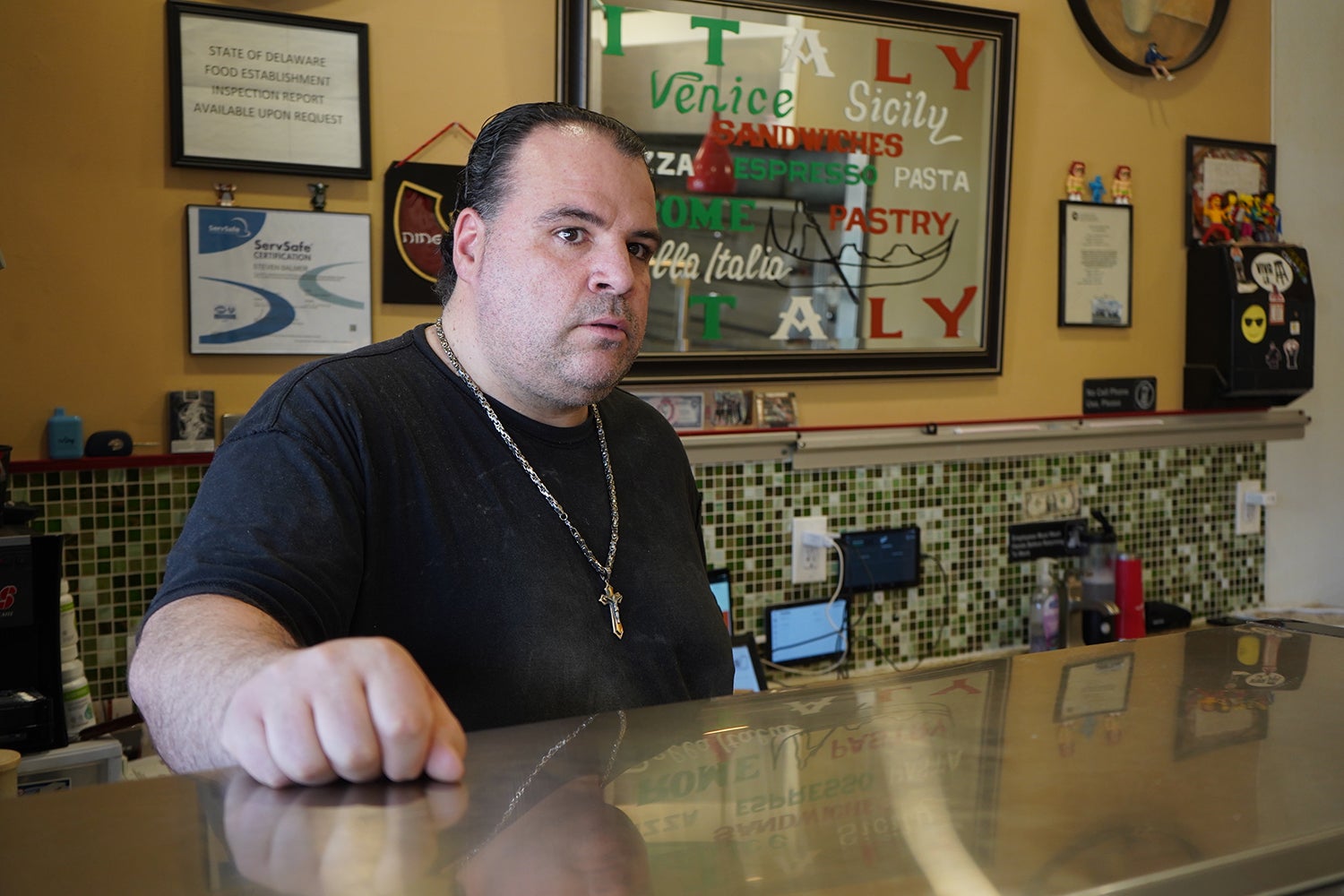Fashion
Tingit is building a marketplace for ‘zero-effort’ repairs, starting with fashion | TechCrunch

Do you have a much-loved jacket with a torn sleeve or pair of grubby kicks gathering dust at the back of your closet? Tingit, a startup out of Lithuania, wants to help people restore their used clothing to its former glory with its newly launched repairs marketplace.
The platform lets you use your phone to snap and upload a quick video of distressed items to get a quote for repair or restoration. If you’re happy with the quote, you can pay through Tingit’s app and then mail your stuff to the chosen repair shop. After that it’s just a case of waiting for a few days or weeks. No need to trawl through back alleys for specialist restorers and wrangle unfriendly shop schedules. The platform takes all the slack.
There’s just one catch for now: Tingit is only available in Lithuania, where the Vilnius-based startup debuted the service in February. However, the startup has just raised a €500,000 pre-seed funding round to keep scaling the business, and CEO and co-founder, Indrė Viltrakytė, says it has its sights on expanding into other markets in Europe. That will likely happen later next year when the company will be looking to raise a seed round.
Lithuania is home to fashion reuse marketplace giant Vinted, so the country’s entrepreneurs have pedigree in this area. Tingit is another pure marketplace play, but it aims to connect people who own damaged/distressed fashion items with businesses that can repair them.
“I grew up with the people who started Vinted. So watching the company go from a small, local shop to this global huge marketplace was really, really inspiring,” Viltrakytė told TechCrunch. “I do hope that we can achieve something similar with repairs, and find synergies with companies that already work on the sustainability front.”
Viltrakytė came up with the idea for Tingit after working in fashion for years and growing frustrated by the industry’s problems with sustainability and overconsumption. This isn’t her first experience as a tech entrepreneur, either: She worked for three years with Vinted co-founder, Justas Janauskas, on a social media startup for teenagers that saw some traction locally before they shut it down. She has also dabbled in digital fashion and crypto/web3.
Still, a platform that handles physical repairs represents a different type of challenge.
“I’m a problem solver. So when I think about something that is broken, I get this urge to fix it,” she said. “I personally tried to repair a lot of items […] and it’s always a huge headache, a hassle. I had a Dyson hair dryer, and it took me six weeks to organize a repair for many, many reasons. So I thought, you know, it’s 2023, there has to be a better way. And I looked around and there was no better way. So I just decided to play with it in the end and see what it could look like.”
Tingit currently connects users with repair and restoration services for clothes, shoes and accessories. This includes specialist restoration work like sprucing up sneakers and handbags as well as more familiar services like dry cleaning.
The decision to focus on fashion is mainly because the four co-founders already had industry expertise to draw on, per Viltrakytė. But if they can build scale, she says there’s no reason to stop there. Repairs for sports goods, toys and consumer electronics could be potential future avenues, but anything sounds possible, provided there’s demand for it and businesses to provide a service.
European Union regulations are a driving force here, with requirements for right to repair coming in alongside expanded ecodesign rules, which include plans for digital product passports. All of this is aimed at powering a transition to a more circular economy so the bloc can meet its 2050 net-zero greenhouse gas emissions climate goal.
The macroeconomic climate may also play to a ‘make do and mend’ hand. Viltrakytė says one of the startup’s investors predicts a recession is coming. “That’s why he thinks repairs could be next wave, because the previous wave was secondhand clothing,” she said.
So far, Tingit’s marketplace has facilitated more than 650 completed repairs and fielded more than 2,500 repair requests from users. It’s working with three local businesses to provide services, according to Viltrakytė — one handles repairs for clothing, another for shoes and bags, and one provides dry cleaning services.
Upcycling and modding (modification) are also part of Tingit’s plan, as is offering recycling. But Viltrakytė says specific adjustments (i.e. tailoring) aren’t a good fit for the hands-off platform approach, as measurements are more accurate when performed in person.
Shoe repairs make up 70% of orders on the platform, currently, and its typical customer is a “busy working mum” looking for more efficient ways to get stuff done.
Viltrakytė admits to being a little surprised there aren’t more men using the platform given how many sneakerheads are male. But she suggests it could be partly down to a lack of awareness about the kind of restoration services that are available.
“I would really like to introduce this concept of seasonal maintenance,” she said, pointing out that a new pair of shoes can have a much longer lifespan if they’re properly looked after. A twice-yearly repair service could be pitched as a “new habit” to invest in to make stuff last longer.
“My personal goal is basically making repairs more like a habit — I always say, like brushing your teeth,” she added.
Prices for repairs and restoration services vary depending on the complexity of the job — starting at €9 for a protective treatment for footwear, €25+ for a zipper replacement on clothing, all the way up to €139+ for a premium handbag restoration.
Viltrakytė noted the startup has had some very high end items sent in for repair/restoration, such as a Hermès handbag worth €10,000. And given the rise in popularity of vintage clothing, fashion resale platforms and second-hand marketplaces, there are some interesting ways a repair marketplace could intersect with that broader trend.
She said the company already gets a lot of enquiries from people sending in screenshots of items they’ve seen on second-hand marketplaces like Vinted, asking how much it would cost to repair.
“I think we can increase the value of used items, because people have no idea what can be done with, specifically, fashion items,” she said. “If you take a really run-down bag, if it’s a luxury bag, a well-made item, you can [restore it] not like new, but like 85% new.”
Tingit is starting as a business to consumer (B2C) marketplace, but Viltrakytė reckons there’s opportunities to expand into B2B2C.
“We can be official representatives for brands — that’s already a proven business model,” she said. “Also, we plan to do API integrations for retailers or other marketplaces like Vinted or Vestiaire Collective.”
The startup is thinking about how it can further dial up its use of technology, too, to make it even less of a faff for people to get their stuff repaired. Viltrakytė said the company wants to work on using AI to automate damage analysis and quote generation, which are manual processes at present. So users wouldn’t even need to take and upload a video of their item, and could just show it to the camera.
AI could also be used to automate the valuation of apparel for resale and to generate data on what’s circulating in the circular economy, which could be of interest to various businesses. Fashion authentication and product lifecycle tracking are other areas Tingit is interested in exploring.
Tingit’s pre-seed funding round was led by Firstpick, a Lithuanian VC fund and accelerator for tech startups in the Baltics. BADideas.fund (Latvia), PurposeTech (Czech Republic) and Heartfelt Capital (Germany) also participated.
Commenting in a statement, Jonė Vaitulevičiūtė, managing partner at Firstpick, said, “There is still a void of knowledge when it comes to leveraging technology to enhance sustainability. That is why we are super excited to see how Tingit will educate consumers and help them create sustainable habits.”










